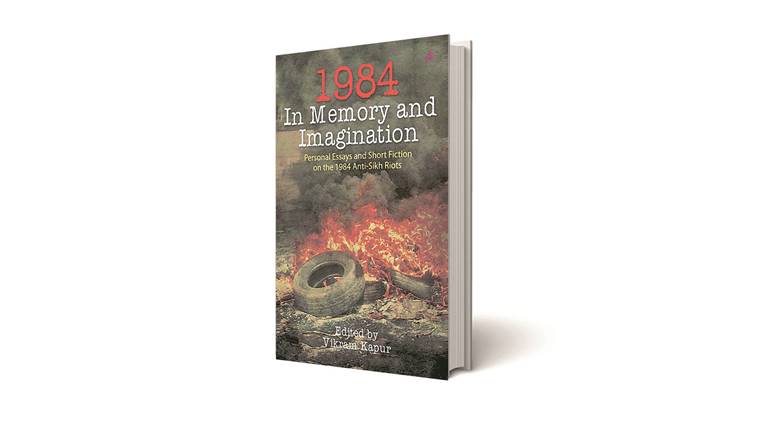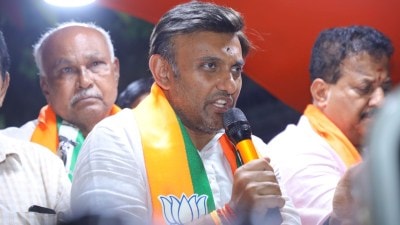- India
- International
Those Who Lived to Tell the Tale
Relocating a lost narrative around the 1984 anti-Sikh riots to open up avenues for closure and healing.
 1984: In Memory and Imagination
1984: In Memory and Imagination
Book Name- 1984: In Memory and Imagination
Edited- Vikram Kapoor
Publisher- Manjul
Pages- 248
Price- 350
Tragedy begets art. The emotions evoked by the barbarity people are capable of have spawned the most crucial, raw, and, ultimately, important literature. Keeping that in mind, the amount of empathic work done on the 1984 Sikh massacre is woefully small. While the events themselves have been hacked into small, consumable pieces, the impact of them, both immediate and historical, has been left untouched and dammed. The positioning of the pogrom itself, caught between two phases of unrest in north India focused around the state of Punjab, meant that anyone sympathising with the victims of the massacre was considered with suspicion. That, coupled with an entire community trying to forget its trauma meant that unlike many other instances of minority castigation, 1984 remained severely underreported and undocumented.
Keeping this in mind, 1984: In Memory and Imagination is an important work. It juxtaposes short fiction with non-fiction narrative accounts. The sparse, almost curt, and, sometimes, dispassionate recollection of the events unfolding in the non-fiction section, leaves a visceral impact. Stone Games by Rizio Yohannan Raj is a welcome perspective beyond the north Indian epicentre. It’s a reminder that the assimilation and deconstruction, of anger and grief cannot be the responsibility of the victims alone. This is reinforced by Humra Qureshi’s essay, Why Not A Collective Cry for Justice!, a sobering reminder of the fact that India is slowly, but surely, cornering her minorities.
Kirpal Dhillon’s 1984: An Overview and Rana Chinna’s When Steel Entered My Soul are especially poignant, considering both were written by men in uniform serving the country, who suddenly found themselves labelled “the other”. The vantage point from where they provide an inside view into the machinations of the government, paints horrifying imagery of callousness and viciousness. In Chinna’s story, he mentions how every Punjabi house in post-Partition Delhi echoed with the same question: “Par pichhon kithho aye si (But from where do you originate)?” Before 1984, most Sikhs in Delhi harked back to their homes in what is now Pakistan. After the massacre, they had two answers, because carefully pieced together lives, scattered after the Partition were torn apart all over again. The comparison of the damage caused by Partition, and that caused by the massacre is a strong, overarching motif that spills into the fiction.
The taut, gripping narrative, which the non-fiction portion builds up, should’ve acted as an incubator for the fiction, infusing it with depth and gravity. It tries to do so valiantly, but, at times, falls short. The Morning After by Mridula Garg consists of beautiful prose, which overshadows the pain it is meant to reflect. Jaspreet Singh’s The Perished and the Saved reads like a faded shadow of his memorable book, Helium, when it could have been the most haunting piece of the collection. NS Madhavan’s When Big Trees Fall, however, stands out as a sparkling piece. Translated from the original story in Malayalam, its urgent prose superimposed on the city of Meerut highlights minority solidarity beautifully. In contrast, Vikram Kapur’s Trilokpuri shows how deep minority fear runs, and how insecure the burgeoning intolerance in the country has made even the most educated and privileged people.

Kapur, in his introduction, mentions how being labelled as “the other” in post 9/11 America gave him an insight into what the Sikhs went through, and how writing was his solace in those dark, confusing times. 1984 was one of the darkest, most confusing times in modern history. Rajiv Gandhi’s infamous statement, “When a big tree falls, the earth shakes” made a mockery of it. But, when the earth shakes, it shifts too, upturning to fertile mud. People are slowly burying seeds of anger into it, and allowing healing to bloom through the shoots of closure. This book will hopefully open up avenues for more writing, closure, and healing. It makes an attempt to relocate a lost narrative, and for that, it must be lauded.
Apr 27: Latest News
- 01
- 02
- 03
- 04
- 05




































